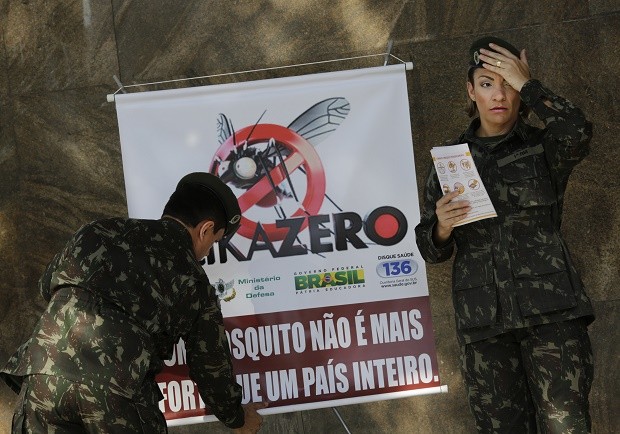Brazil sends military to fight Zika mosquitoes

Army soldiers set up a sign that reads in Portuguese ‘A mosquito is not stronger than an entire country’ at the Central station in Rio de Janeiro, Brazil, Saturday, Feb. 13, 2016. More than 200,000 army, navy and air force troops are fanning out across Brazil to show people how to eliminate the Aedes aegypti mosquito that spreads the Zika virus, which many health officials believe is linked to severe birth defects. The nationwide offensive is part of President Dilma Rousseff’s declared war on the virus that has quickly spread across the Americas. AP
SAO PAULO, Brazil — More than 200,000 army, navy and air force troops fanned out across Brazil on Saturday to teach people how to eliminate the Aedes aegypti mosquito that spreads the Zika virus that many health officials believe is linked to severe birth defects.
The nationwide offensive is part of President Dilma Rousseff’s declared war on the virus that has quickly spread across the Americas.
READ: Zika virus persisted in man’s semen for 2 months—report | MEDICAL FILES: Undetected Zika in our midst?
According to Brazil’s government, about 220,000 members of the armed forces accompanied by community health agents and mosquito control teams were deployed Saturday to help educate the population on how to eliminate mosquito breeding areas in and around their homes. The teams were expected to visit 3 million homes in 350 cities to distribute explanatory pamphlets.
Wearing a white T-shirt printed with the campaign’s “Zero Zika” slogan, Rousseff visited Rio de Janeiro’s working class neighborhood of Zeppelin. She was accompanied by Mayor Eduardo Paes and Rio de Janeiro state governor Luiz Fernando Pezao.
Article continues after this advertisementThe president visited three homes and chatted with residents about the importance of eliminating the breeding areas for the mosquito that also transmits dengue, chikungunya and yellow fever.
Article continues after this advertisementIn one house, she sprayed insecticide in drains that could serve as mosquito breeding areas.
Rousseff said in brief comments to reporters that the Zika outbreak will not stop this year’s Olympic Games from being held in Rio de Janeiro as scheduled, starting on Aug. 5.
To attract the attention of commuters at Rio’s main train station, an army band played Michael Jackson’s music while soldiers distributed flyers with information on eliminating mosquito breeding places.
“We must all understand that combating the mosquito is a priority,” said Brazilian Army spokesman Col. Gerson Freitas.
The O Globo newspaper reported Saturday that troops participating in the Rio de Janeiro campaign are avoiding slums dominated by drug-trafficking gangs.
Outside Maracana Stadium, Japanese tourist Noko Sudrura said that she put aside concerns about the Zika virus so she could experience Brazil’s recent Carnival.
“So if I get sick, I will only have myself to blame,” she laughed.
The Aedes aegypti mosquito lives largely inside homes and can lay eggs in even a bottle-cap’s worth of stagnant water. The dishes beneath potted plants are a favorite spot, as are abandoned tires, bird feeders and even the little puddles of rainwater that collect in the folds of plastic tarps.
The Zika virus was first identified in Uganda in 1947 and subsequently spread to parts of Asia. Brazil recorded its first case in mid-2015. Researchers don’t know how the virus made the jump, but two theories suggest it may have arrived with tourists visiting the country for the 2014 World Cup soccer tournament or for an international canoeing competition the same year.
Thanks to Aedes aegypti, the disease quickly spread across Brazil and to more than 20 countries in the region, the Caribbean and beyond, leading the World Health Organization to declare an international emergency.
Zika’s immediate effects are mild, consisting mostly of a moderate fever and a rash, and only a fifth of those afflicted notice any symptoms.
But Brazilian authorities also say they have detected a spike in cases of microcephaly, a condition that leaves infants with unusually small heads and can result in brain damage and numerous developmental and health problems. The link between Zika and microcephaly remains unproven.
Since October, 5,079 suspected cases of microcephaly have been reported, Brazil’s Health Ministry said on Friday. Of those, 462 cases had been confirmed and 765 discarded. Of the confirmed cases, 41 have been connected to Zika.